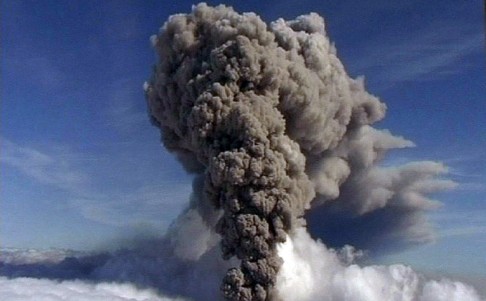
Airlines on alert for ashclouds if Iceland volcano erupts
Carriers watching for eruption, fearing repeat of 2010, when 100, 000 flights had to be cancelled
Airlines are on alert as one of Iceland's biggest volcanoes rumbles to life, threatening ash clouds that could force flight cancellations across the North Atlantic, the busiest international travel market.
Air France, Lufthansa and Delta Air Lines are among carriers watching the Bardarbunga volcano for an eruption, the latest in a series of actual or potential hazards to interfere with commercial air routes. Iceland's Civil Protection Agency began evacuating the area north of the volcano on Tuesday.
The seismic activity raised concern that airlines may face a repeat of the 2010 disruptions when a cloud belched from the Eyjafjallajokull volcano forced carriers to erase more than 100,000 flights and caused about US$1.7 billion in lost revenue.
Ash is a menace to jetliners because the glass-like particles can damage engines by melting and congealing inside them.`
"If the volcano erupts - which we don't know - how explosive or non-explosive the eruption is depends entirely on where the magma reaches the surface," Melissa Anne Pfeffer, atmospheric volcanologist at the Icelandic Met Office, said. Bardarbunga lies beneath Vatnajokull, Europe's largest glacier.
Molten rock bubbling up under the icecap would create "a more explosive eruption", with the mix of high heat and a sudden meltdown of frozen water, than one occurring in the open, Pfeffer said. Northern European air traffic would be affected if Tuesday's winds continued during an eruption, she said.
Europe is more prepared to deal with volcanic ash these days [than in 2010]
While regional air traffic manager Eurocontrol said the volcano was not affecting aviation now, the "seismic swarm" of earthquakes recorded around the caldera's rim this week was the largest seen since the last eruption, in 1996, according to the website of FutureVolc, a European safety monitor. Iceland increased the eruption risk to "orange", the second-highest level, on Monday.
The spectre of ash clouds is the latest worry for airlines that have had to divert flights in recent weeks around war-torn Syria, Iraq and Ukraine; weigh whether to fly to Tel Aviv after a missile struck near the airport; and adjust Africa operations as Ebola infections trigger public-health alerts. Russia also has threatened to limit flyovers across Siberia by some airlines.

There was less disruption to travel from a 2011 eruption, which was smaller and only affected airports in Iceland and northern Germany for a few hours.
"Europe is more prepared to deal with volcanic ash these days," Eurocontrol said in a statement. "We have better mechanisms in place than we did in 2010."
Roads in a sparsely populated area north of Bardarbunga were closed on Tuesday, as the Meteorological Office said it had recorded some 2,600 tremors over the past four days.
Bardarbunga, Iceland's second-highest peak, rising to more than 2,000 metres, caps the country's largest volcanic system.
"We meet twice a day, but the earthquake activity still comes in waves. There do not seem to be any changes, but it is still very powerful," Vidir Reynisson, department manager at Iceland's Civil Protection Department, told broadcaster 365.
